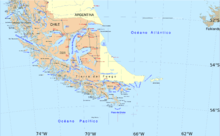José Emperaire
José Emperaire (also: Joseph, born March 10, 1912 , Semons , Isère ; † December 12, 1958 , Posonby , Riesco , Chile ) was a French ethnologist at the Musée de l'Homme in Paris . He worked in the America department and was a specialist on the indigenous peoples of Tierra del Fuego , especially the Alakaluf . He died very early when he was buried in a cave during excavation work, on December 12, 1958.
Life
Emperaire was born in Semons, France. After graduating from high school, he studied ethnology and embarked on a scientific career. He became an employee of the Center national de la recherche scientifique and in 1958 was appointed Chargé de recherche (research officer). From 1945 he took part in research on prehistory in France and completed his training at the Musée de l'Homme and the University of Lyon .
plant
Emperaire was commissioned by the Musée de l'Homme with an ethnographic mission in Eastern Patagonia . To this end, from December 1945 to August 1948, accompanied by Louis Robin, he sailed the island kingdom in a 7-meter yacht. They made ethnological, linguistic and anthropological studies of the last surviving groups of Tierra del Fuego, especially the Alakaluf . He also carried out initial archaeological exploration and excavations at sites in the Strait of Magellan and Tierra del Fuego. At the request of Paul Rivet , he then undertook excavations in Brazil on the Río Paraná and taught at the Universidade Federal do Paraná .
He was a member of the Société des Américanistes .
Death and legacy
In 1958 Emperaire returned to Chile with his wife and daughter to carry out excavations. On December 12th, he was buried in a grotto near Posonby on Riesco Island by a landslide while he was working there alone. Unfortunately he was rescued too late by his wife Annette Laming-Emperaire and a worker. Resuscitation attempts and paramedics who came very quickly from Punta Arenas could no longer help him.
José Emperaire left an important life's work behind. His testimonies to the life of the last pure Alakalufs are a lasting, significant contribution to ethnology itself and especially to French ethnology. The large number of documents and artifacts that have been collected has permanently changed the view of the early history of the southernmost regions of the South American continent.
The novel-like book They Were the First by Jean Raspail is based in large part on the research results of Emperaire and is also dedicated to him.
literature
- Guy de Beauchêne: José Emperaire, 1912–1958. In: Journal de la Société des Américanistes. Vol. 48, 1959, ISSN 0037-9174 , pp. 245-248 .
- Annette Laming-Emperaire: Missions archéologiques françaises au Chili Austral et au Brésil Méridional. Datations de quelques sites par le radiocarbone. In: Journal de la Société des Américanistes. Vol. 57, 1968, pp. 77-99 .
- Jean Raspail : You were the first. Tragedy and end of the Tierra del Fuego Indians. A chronicle of novels. Langen Müller, Munich 1988, ISBN 3-7844-2216-0 (Qui se souvient des hommes ... Paris 1986).
Web links
- José Emperaire 1915-1958 , obituary.
- Les indiens Alacalufs (Kawésqar)
- Missions archéologiques françaises au Chili Austral et au Brésil Méridional p. 6 Gisement de Ponsonby sur l'île Riesco.
- Nomades de la mer
- The Société des Américanistes
| personal data | |
|---|---|
| SURNAME | Emperaire, José |
| ALTERNATIVE NAMES | Emperaire, Joseph (German) |
| BRIEF DESCRIPTION | French prehistorian and ethnologist |
| DATE OF BIRTH | March 10, 1912 |
| PLACE OF BIRTH | Semons , France |
| DATE OF DEATH | December 12, 1958 |
| Place of death | Posonby, Riesco (island) , Chile |

